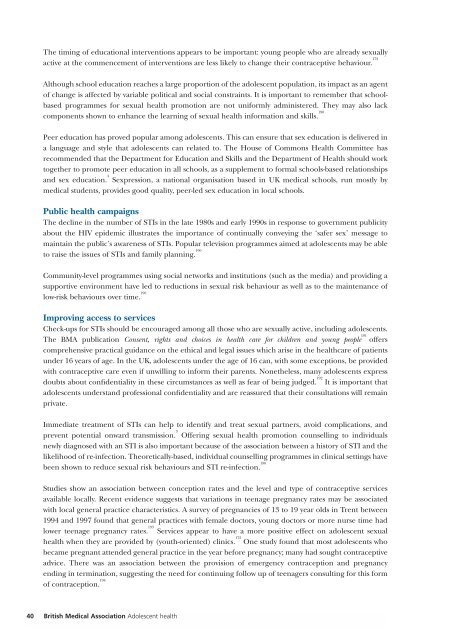Alcohol misuse: tackling the UK epidemic - London
Alcohol misuse: tackling the UK epidemic - London
Alcohol misuse: tackling the UK epidemic - London
Create successful ePaper yourself
Turn your PDF publications into a flip-book with our unique Google optimized e-Paper software.
40<br />
The timing of educational interventions appears to be important: young people who are already sexually<br />
active at <strong>the</strong> commencement of interventions are less likely to change <strong>the</strong>ir contraceptive behaviour. 173<br />
Although school education reaches a large proportion of <strong>the</strong> adolescent population, its impact as an agent<br />
of change is affected by variable political and social constraints. It is important to remember that schoolbased<br />
programmes for sexual health promotion are not uniformly administered. They may also lack<br />
components shown to enhance <strong>the</strong> learning of sexual health information and skills. 190<br />
Peer education has proved popular among adolescents. This can ensure that sex education is delivered in<br />
a language and style that adolescents can related to. The House of Commons Health Committee has<br />
recommended that <strong>the</strong> Department for Education and Skills and <strong>the</strong> Department of Health should work<br />
toge<strong>the</strong>r to promote peer education in all schools, as a supplement to formal schools-based relationships<br />
and sex education. 4<br />
Sexpression, a national organisation based in <strong>UK</strong> medical schools, run mostly by<br />
medical students, provides good quality, peer-led sex education in local schools.<br />
Public health campaigns<br />
The decline in <strong>the</strong> number of STIs in <strong>the</strong> late 1980s and early 1990s in response to government publicity<br />
about <strong>the</strong> HIV <strong>epidemic</strong> illustrates <strong>the</strong> importance of continually conveying <strong>the</strong> ‘safer sex’ message to<br />
maintain <strong>the</strong> public’s awareness of STIs. Popular television programmes aimed at adolescents may be able<br />
to raise <strong>the</strong> issues of STIs and family planning. 160<br />
Community-level programmes using social networks and institutions (such as <strong>the</strong> media) and providing a<br />
supportive environment have led to reductions in sexual risk behaviour as well as to <strong>the</strong> maintenance of<br />
low-risk behaviours over time. 190<br />
Improving access to services<br />
Check-ups for STIs should be encouraged among all those who are sexually active, including adolescents.<br />
The BMA publication Consent, rights and choices in health care for children and young people 191<br />
offers<br />
comprehensive practical guidance on <strong>the</strong> ethical and legal issues which arise in <strong>the</strong> healthcare of patients<br />
under 16 years of age. In <strong>the</strong> <strong>UK</strong>, adolescents under <strong>the</strong> age of 16 can, with some exceptions, be provided<br />
with contraceptive care even if unwilling to inform <strong>the</strong>ir parents. None<strong>the</strong>less, many adolescents express<br />
doubts about confidentiality in <strong>the</strong>se circumstances as well as fear of being judged. 192<br />
It is important that<br />
adolescents understand professional confidentiality and are reassured that <strong>the</strong>ir consultations will remain<br />
private.<br />
Immediate treatment of STIs can help to identify and treat sexual partners, avoid complications, and<br />
prevent potential onward transmission. 3<br />
Offering sexual health promotion counselling to individuals<br />
newly diagnosed with an STI is also important because of <strong>the</strong> association between a history of STI and <strong>the</strong><br />
likelihood of re-infection. Theoretically-based, individual counselling programmes in clinical settings have<br />
been shown to reduce sexual risk behaviours and STI re-infection. 190<br />
Studies show an association between conception rates and <strong>the</strong> level and type of contraceptive services<br />
available locally. Recent evidence suggests that variations in teenage pregnancy rates may be associated<br />
with local general practice characteristics. A survey of pregnancies of 13 to 19 year olds in Trent between<br />
1994 and 1997 found that general practices with female doctors, young doctors or more nurse time had<br />
lower teenage pregnancy rates. 193<br />
Services appear to have a more positive effect on adolescent sexual<br />
health when <strong>the</strong>y are provided by (youth-oriented) clinics. 173<br />
One study found that most adolescents who<br />
became pregnant attended general practice in <strong>the</strong> year before pregnancy; many had sought contraceptive<br />
advice. There was an association between <strong>the</strong> provision of emergency contraception and pregnancy<br />
ending in termination, suggesting <strong>the</strong> need for continuing follow up of teenagers consulting for this form<br />
of contraception. 194<br />
British Medical Association Adolescent health
















